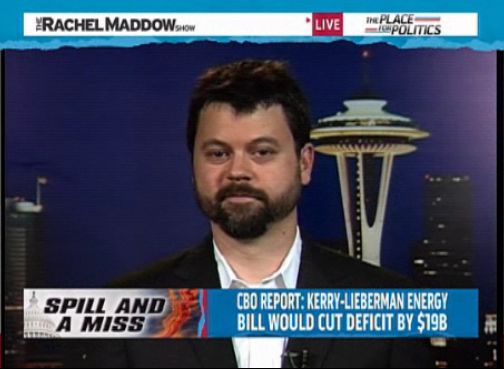I was on the Rachel Maddow Show last night. While Maddow herself is reporting from Afghanistan and Iraq, the show is being guest hosted by Chris Hayes, political editor at The Nation. Here’s the bit:
[vodpod id=ExternalVideo.1012193&w=425&h=350&fv=launch%3D38159001%26width%3D400%26height%3D320]
As to the substance, I’d add one thing. Chris frames the bill in the Senate as one designed to reduce oil use. While there will be such measures in it, much of the controversy around the bill has to do with the power sector — that is, changing the way we make and use electricity, which is a separate issue. The bulk of the reductions in greenhouse gas emissions will come from the power sector. What carbon price may survive in the bill, in the form of a utility-only cap-and-trade system, will apply only to the power sector.
Oil politics and electricity politics are distinct beasts with distinct coalitions and dynamics. They’re being crammed together in this bill, which is serving to obscure some of those differences. The oil-related measures in the bill are reasonably popular on a bipartisan basis (mainly because they don’t include a gas tax). An oil-focused bill could probably get to 60 votes. But an oil-focused bill wouldn’t be a climate bill. The struggle over the power sector adds a huge layer of difficulty, since many regions of the country benefit from artificially suppressed electricity rates and punish any politician who threatens to raise them. That can’t last, of course, but it’s enough to fubar the politics of this bill.
The other thing I’d add in retrospect is a little bit of outrage. At this point I’m fairly inured to Senate venality, so maybe I came off a bit dry about the bill’s diminution. But every American has a right to be angry about what’s happening. The National Academy of Sciences has confirmed yet again that climate change is a serious and imminent danger. The U.S. has pledged to its international partners that it will act. Military officials support action; businesses support action; religious leaders support action; health groups support action. A majority of the American public supports action. The House of Representatives already took action. A majority of legislators in the Senate support action.
Yet action on climate is being blocked by the lockstep nihilism of the Republican minority and the unprincipled cowardice of “centrist” Democrats. It so happens that in the Senate, rural and fossil fuel-dependent areas are overrepresented and there is an absurd, undemocratic 60-vote supermajority requirement for all legislation. These accidents of history present barriers to action that are all but insuperable, even by leaders with more ambition and less fear, even in a time of less economic anxiety. In this case, the Senate’s dysfunction may have devastating consequences for our children and grandchildren. It’s outrageous.



